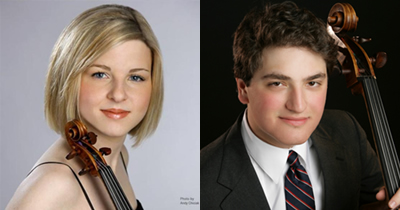The music of the Romantic era often possesses a narrative element, telling a story through sound. For the last concert this season of the Asheville Chamber Music Series, Trio Cavatina displayed their mastery as musical storytellers, infusing works by Schumann and Schubert with dramatic energy. There was something especially fresh and exciting about the trio, something this reviewer initially was unable to classify. As the concert progressed, however, it became clear that the trio members were committed to their role as musical dramatists, emphasizing the many moods of each piece they were performing. Violinist Harumi Rhodes, cellist Priscilla Lee, and pianist Ieva Jokubaviciute held the audience in their grasp for the entire show. Everyone listening sat at the edge of his or her seat, waiting for the next chapter of the musical story to unfold.
The concert opened with three of Schumann’s six Etuden in Kanonischer Form, or six canonic studies. Originally composed for organ, Schumann’s friend, Theodor Kirchner arranged these six canons for piano trio. The first canon, “Nicht zu schnell,” (“not too fast”), showcased the trio’s detailed understanding of the music. The canon theme always stood out clearly, never obfuscated by the tapestry of Baroque ornamentation, and there was clarity between all three voices at all times. In the lyrical second canon, “Mit innigem Ausdruck” (“with heartfelt expression”), Lee performed the theme with a sweet yet haunting tone. The attention to dynamic balance was impeccable in this selection, as the distinct timbre of each instrument remained clearly audible, even when the trio played at full volume. The jaunty spiccato bowing and jocund mood of the third canon “Etwas schneller” (“somewhat fast”), provided an excellent contrast to the second canon. Rhode’s and Jokubaviciute’s sound seamlessly blended into a single timbre at many moments, the violinist’s quick bow strokes melding into the pianist’s staccato touch at the keyboard.
The first half continued with Schumann’s Piano Trio in D minor, a chamber work with all the expansiveness and drama of an orchestral tone poem. The mysteriously meandering theme of the movement’s opening theme was captured magnificently by the trio. The three performers started at a whisper before erupting into a full yet controlled sound. The ensuing interplay between Rhodes and Lee was executed with intense delicacy, Lee’s cello echoing Rhode’s legato lines with effortless mastery. In the middle of the movement, Lee and Rhode’s crystalline harmonics were particularly effective, accompanied with cascading subtlety by Jokubaviciute’s immaculate technique. Fervently committed to presenting the dramatic arc of each movement, the trio masterfully exaggerated the lyrical, almost pastoral-like theme in the relative major key, providing a wonderful contrast to the “sturm und drang” of the movement’s opening D minor theme.
The second movement got off to a shaky start as the trio played the unison rhythmic gestures of the first few measures slightly out of sync. However, this was quickly amended, as all three musicians locked into a capriciously percolating motor rhythm. The third movement stood out as the highlight of the trio’s performance, showcasing the ensemble’s adventurous spirit and unbridled musicality. The opening violin solo was beautifully interpreted by Rhodes as she transcended the physical limitations of her bow and strings to create a melancholic timbre reminiscent of a mother singing a lullaby. Rhode’s last bow stroke seamlessly decrescendoed into Lee’s first note; this almost telepathic continuation of the melody by Lee was a testimony to the trio’s dedication to the intimacy of chamber music. Both Rhodes and Lee demonstrated a beautifully honest directness in their playing, as both musicians got to the emotional core of the movement’s gentle opening. Jokubaviciute should also be applauded for her sensitive and focused accompaniment.
Following intermission, Trio Cavatina launched into Schubert Piano Trio No. 1 in B-flat, capturing the first movement’s spritely character with uncompromising ebullience. Jokubaviciute received the opportunity to shine here, executing the rapid scalar runs with delicate precision. Her brisk embellishments never overpowered the melody of the theme, but actually enhanced it with great taste. Rhodes and Lee both demonstrated their consummate abilities as accompanists when supporting Jokubaviciute. While some intonation issues persisted throughout the development, the trio did a marvelous job of capturing the contrasting dramatic edge of this section, exaggerating the somberness of the minor tonality.
The second movement was one of the finest parts of the evening’s performance as the ensemble interpreted Schubert’s beautiful melodies with refined elegance and emotional directness, never succumbing to vibrato-ridden schmaltz. Jokubaviciute’s playful yet understated countermelodies provided a wonderful backdrop to Rhode’s and Lee’s sweet playing. At certain moments, Jokubaviciute evoked a gentle and soft texture from the keyboard, reminiscent of a toy piano; this was just one example of the myriad of timbres she was able to create at the piano throughout the concert.
The following scherzo was performed with similar playfulness. Once more, the individual character of each melodic line could be distinctly heard. All three performers provided one another with enough space to stand out, without losing the rhythmic momentum of the scherzo. The fourth movement was an excellent selection to showcase the performers, as Schubert divided the opening theme into solo episodes for all three instruments. A unity of character, however, was still maintained throughout the ensemble, in both the expanded solo sections and the dramatic moments of textural and rhythmic unison.
The ensemble received a well-deserved standing ovation. The emotional directness and honesty of the trio seemed to really resonate with the audience. This reviewer was moved at certain moments by the trio’s lyrical, passionate and adventurous outlook on the two romantic masterpieces, and hopes they will soon return for another performance in Western North Carolina.











